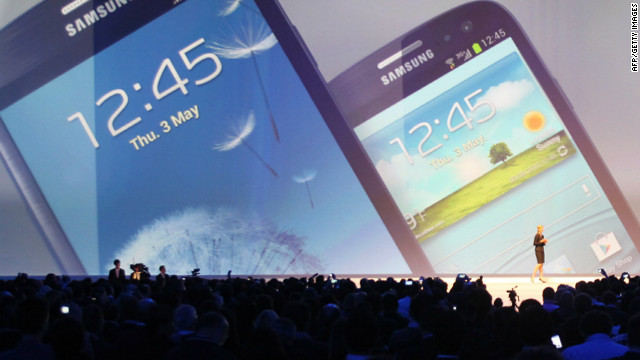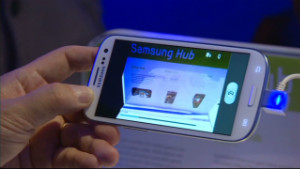Fri May 4, 2012
 |
| Samsung |
Samsung unveiled its latest flagship smartphone, the Galaxy S III, at Earls Court in London on Thursday.
STORY HIGHLIGHTS
- Jenkins: Samsung's strategy different to its main rival, Apple
- The South Korean company has a phone to suit pretty much every potential customer
- But Samsung's scale could turn out to be a weakness as well as a strength, says Jenkins
- "In some respects, Samsung reminds me of Sony in the years before it all went wrong"
Hiring such a large space
and filling it full of tech heads from all over the world was a sign of
extreme confidence from the Korean electronics giant, and you only have
to take a look at its last set of figures to see where the bravado is
coming from. Net profit for the quarter was 5.05tn won, up 81%, and the
main driver for this success was Samsung's Galaxy range of phones.
The Galaxy range has
certainly been selling like hot cakes. This week, trend-watchers IDC put
the company ahead of the competition in its latest state of the market analysis.
What's interesting to me
is how different Samsung's strategy is to its other major smartphone
competitor, Apple. There is only one iPhone released every year, and
design-wise, each one has been broadly the same as the previous model,
with the same size screen.
 |
| Samsung Galaxy S III primed for release |
Read more: Samsung unveils Galaxy S III smartphone with face, voice recognition
In contrast, Samsung has a bewildering number of different models
that, viewed together, make almost no sense at all to the casual
observer. This might seem like a recipe for confusion, but it also means
that that Samsung has a phone to suit pretty much every potential
customer. Want something pocketable that's cheap? There's a Samsung
Galaxy for that. Need lots of power, a massive screen and a stylus to
draw pictures with? Samsung Galaxy can help. And on it goes.
Apple is fantastic at
making a product that's very aspirational, and it makes an enormous
amount of money on every iPhone, but in terms of simply shifting a lot
of phones and achieving huge scale, it's Samsung that has the winning
strategy.
Both Apple and Samsung
are so successful in fact, the battle for the top smartphone slot is
starting to look like a two-horse race.
But it won't necessarily
always be this way. HTC was the darling of the mobile industry a while
back until Samsung arrived to eat its lunch. The transformation in the
company's fortunes was rapid, and there's every possibility that Samsung
could see an equally rapid turnaround at some point in the future -- in
mobiles, you're only as good as your last hit product.
There's also a chance
that Samsung's scale could turn out to be a weakness as well as a
strength. In some respects, Samsung reminds me of Sony in the years
before it all went wrong. There are lots of divisions that don't appear
to communicate with each other very well, making a vast number of
different products, most of which are decent, but not outstanding.
Read more: New Samsung 'not for everyone'
There's a desire to be
the number one player in every category Samsung is in, which is
laudable, but probably unachievable. Does Samsung really need to be the
number one maker of cameras in the world? Or MP3 players? Probably not. I
can't help but wonder whether its smartphone profits are covering up
some deeper organizational problems. Then again, it seems to be working
for now, so it may all turn out fine.
If a company was to
snatch the smartphone crown from Samsung, which would it be? One answer
might be Nokia, which may seem like a crazy thing to say following its
latest set of disastrous financial results. But there is still a chance
that it might not be game over.
Nokia's flagship mobile
running Microsoft's Windows Phone, the Lumia 900, has recently appeared
in America to decent critical acclaim. In the U.S., Android doesn't have
quite the same grip on the market that it does in the UK in particular,
so there's an outside chance Nokia could sell enough handsets to
convince developers deal with the platform's biggest problem -- a lack
of apps.
If that happens, the launch of Windows Phone 8 could open the whole field up again.

No comments:
Post a Comment